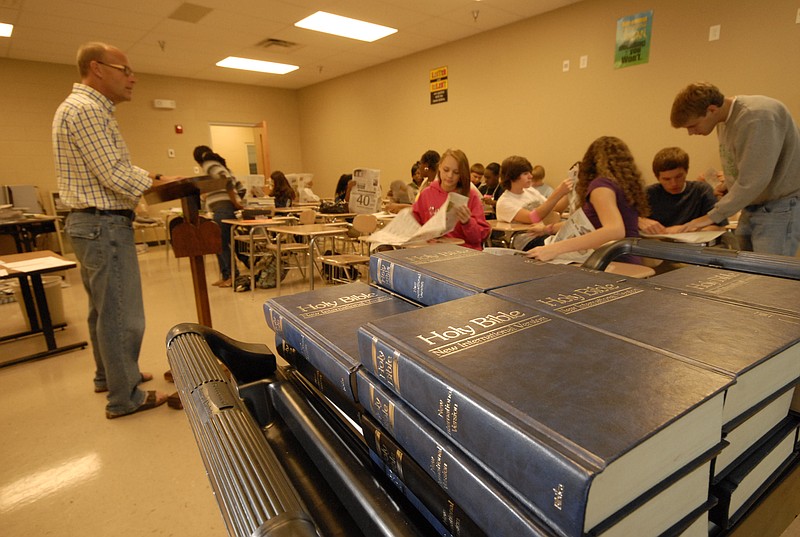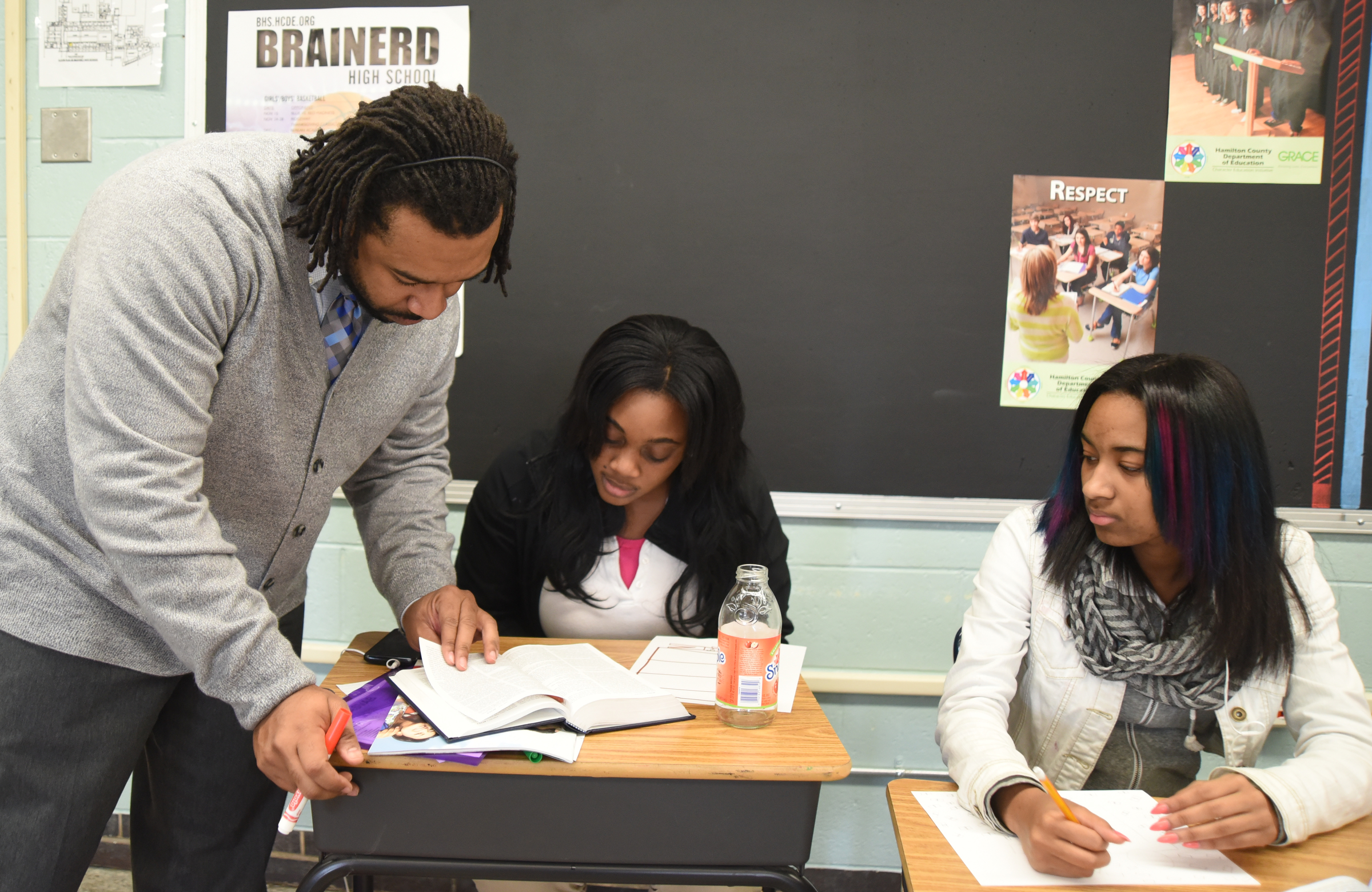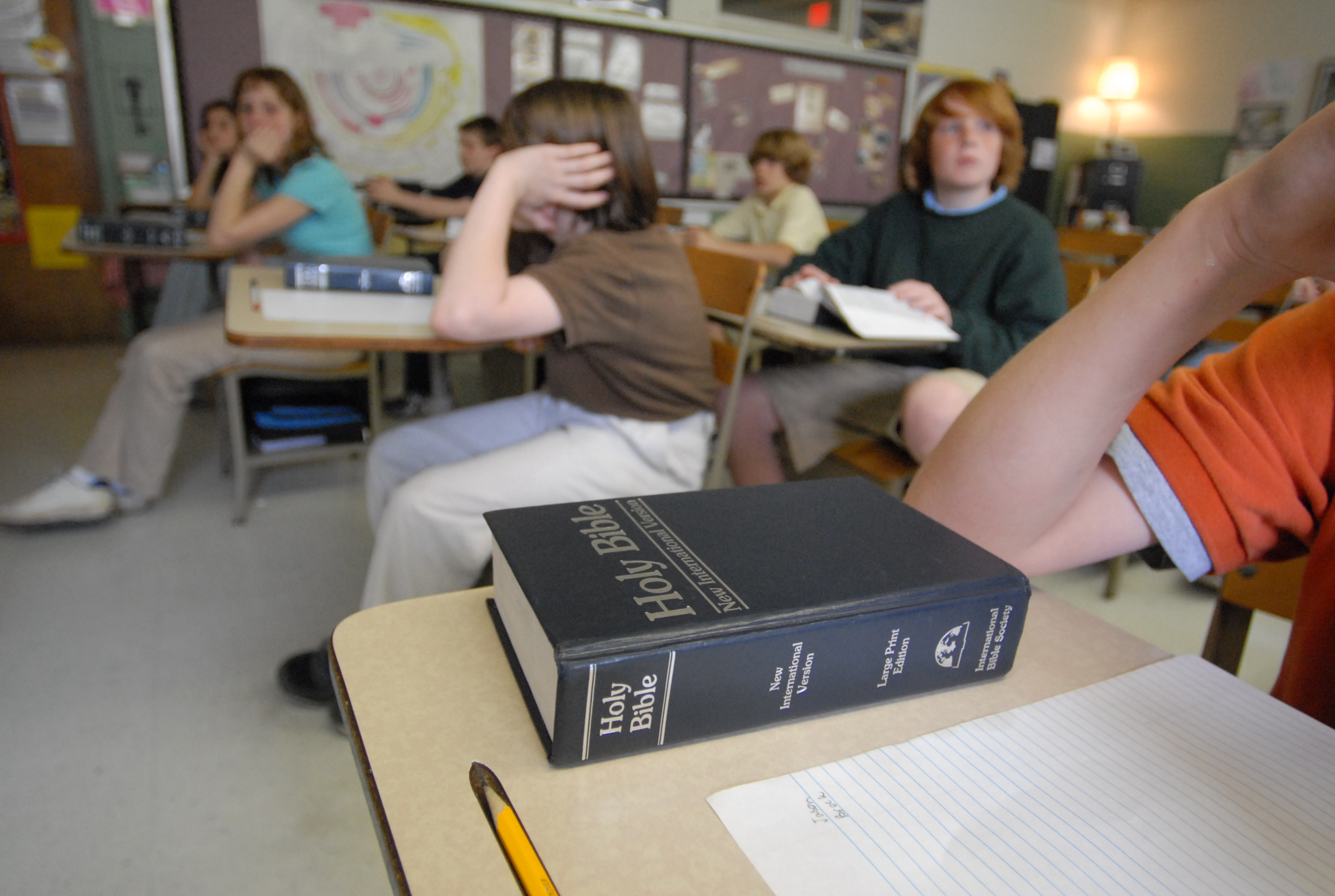Hamilton County Schools officials are in the early stages of forming a committee to review the Bible in the Schools curriculum, a privately-funded program that puts elective Bible history courses in local public schools.
Officials hope to include individuals with different faith backgrounds, Superintendent Justin Robertson said at the school board's regular October meeting.
"What we talked about is getting Bible in the Schools curriculum on a regular review, like we do any other course," Robertson said at the meeting.
Board member Ben Connor, D-Chattanooga, volunteered to be part of the committee.
"I know that there have been a few different instances in our recent past regarding slight misdoings of the class in general," Connor said at the October meeting. "First, (it's) not being aimed at literacy. Second, some people have brought up in different ways that it's more of an indoctrination instead of what's meant to be."
Bible in the Schools' mission is "to advance Bible education for students in Hamilton County public schools," according to its website. The program is offered in 32 middle and high schools and serves roughly 4,000 students. This year, private donors gave around $2 million for the program, which the board approved Oct. 20. The nonprofit organization reimburses the school district each year for operating the program.
The program's website describes the Bible courses as "nondevotional and viewpoint-neutral."
The site also says Bible study is essential to a well-rounded education due to the book's influence on literature and American history.
"Without the study of the Bible in our schools, we run the risk of creating an avoidable deficiency in American education," the site says. "Deep knowledge requires cultural literacy. When the schools of a nation fail adequately to transmit the literate national language and culture, the unity and effectiveness of the nation will necessarily decline."
It goes on to say the Bible influenced ideas such as "democracy and republicanism."
In February, Juniper Russo, the mother of an eighth grade student at East Hamilton Middle School, withdrew her daughter from a Bible class after she felt she was being indoctrinated.
Russo, who is Jewish, said she supported her daughter learning about the Bible from a literary and historical standpoint but came to believe there was a religious agenda after seeing some of her daughter's homework.
"One of my big problems was that it was opinion-based," Russo said in a phone call. "One of the questions (was), 'True or false? It's important to read (the Bible) even if you're not a Christian.' And that's an opinion statement. There cannot be a correct answer to an opinion statement. To have something like that, and for people to be graded on whether they agree with the teacher's opinion about the Bible, that's one of those things that is pretty obviously in violation of the separation of church and state."
Russo drew the line after her daughter's teacher allegedly made antisemitic remarks, saying, "If you want to know how to torture a Jew," make them say the Hebrew name of God "out loud."
The teacher also presented videos by the BibleProject, an organization that helps "people experience the Bible as a unified story that leads to Jesus," according to its website.
Russo's daughter was shown, among others, a video called "The Story of the Bible," which emphasizes the struggle between good and evil. God is referred to as the "author of all reality," and the Bible is presented as a collection of many books written over a long period of time to tell a "unified story."
"(The video) has some really obvious religious iconography," Russo said. "There's a path where it shows sunlight and happiness on one side, which represents Christianity, and darkness and thunderstorms on the other that represents all other religions."
Hamilton County Schools investigated the matter and determined that while the teacher did say "to hear or say that word would be a torturous or difficult experience" for Jews, the teacher did not intend to instruct the class on how to actually torture a Jewish person.
A committee was also formed to investigate the content of the course, district spokesman Steve Doremus said in an email. He said that included the BibleProject videos, which were determined to be acceptable for the course.
"The curricular resources were reviewed prior to the beginning of the school year to ensure that district resources were in alignment with the improved Tennessee state standards and state law," he said.
In 1963, the U.S. Supreme Court in Abington School District v. Schempp found that daily devotional Bible readings in public schools violated the First Amendment's separation of church and state.
But Justice Tom C. Clark wrote on behalf of the 8-1 majority, "Nothing we have said here indicates that such study of the Bible or of religion, when presented objectively as part of a secular program of education, may not be effected consistently with the First Amendment."
Prior to the 2022-23 academic year, Hamilton County Schools required Bible teachers to take a course on the law and teaching the Bible.
"All Bible teachers completed a compliance course prior to the beginning of the school year to review law as it pertains to the legalities of instruction of the Bible course," Doremus said.
Bible in the Schools President Cathy Scott said her organization believes the district is complying with the law.
"For the past 100 years, Bible in the Schools has been pleased to provide the funding for the Hamilton County Bible elective program, at no cost to taxpayers. We have full confidence that Hamilton County Schools is complying with all laws and state standards from the Tennessee Department of Education that regulate the program's content and how the courses are taught," Scott said in an email.
According to Bible in the Schools curriculum, some of the general objectives are to analyze the moral and philosophical concepts presented in the Bible, to explore the life of Jesus as recounted in the Bible and to expose the student to a chronological view of biblical history.
The committee will begin the curriculum review in spring, Doremus said. In the meantime, Connor said in a text message he plans on attending Bible classes and will bring a full report back to the board to ensure the classes comply with state law.
Contact Carmen Nesbitt at cnesbitt@timesfreepress.com or 423-757-6327. Follow her on Twitter @carmen_nesbitt.


